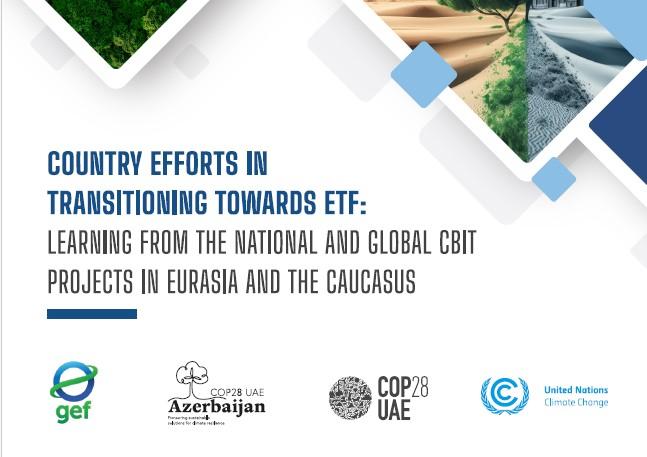December 5, in Azerbaijan Pavilion, Dubai, UAE, the side-event on Country Efforts in Transitioning towards ETF: Learning from the National and Global CBIT projects in Eurasia and the Caucasus will be held. The main objective of the side-event is to present the country-based progress on climate transparency in Eurasia and the Caucasus via support received from national and global CBIT projects and share lessons learned from their journey towards ETF. The speaking countries are also expected to think and discuss about the development progress of their first BTRs and what support needs arise behind this perspective.
The Enhanced Transparency Framework (ETF) is the backbone of the implementation of the Paris Agreement on Climate Change, as defined in its Article 13, and it is the internationally-agreed mechanism to monitor the progress of the Nationally Determined Contributions (NDCs). The Global Environment Facility supports developing countries in building their institutional and technical capacities to meet the requirements of the ETF through: (i) Capacity Building Initiatives for Transparency at the global and national level via UN implementing agencies in the face of UNDP, UNEP and FAO, (ii) Support for reporting obligations under the Convention, i.e., National Communications (NCs) and Biennial Transparency Reports (BTRs); and (iii) Global support for the ETF.
At the global level, GEF supports the Capacity Building Initiative for Transparency – Global Support Programme (CBIT-GSP), implemented by UNEP and executed by UNEP-CCC. This global project coupled with the support provided by the national CBIT projects and enabling activities on NC and BTRs, aim to strengthen national institutions for transparency-related activities in line with national priorities, to provide relevant tools, training, and assistance for meeting the provisions stipulated in Article 13 of the Agreement as well as to assist in the improvement of transparency over time.
At the national level, the similar projects on capacity building for transparency are implemented by various implementing agencies. For example, the “Capacity Building for Azerbaijan to Meet the Paris Agreement's Enhanced Transparency Framework” aims to enhance Azerbaijan's capacity to implement the Paris Agreement and the “Azerbaijan: Enabling Activities for the Preparation of the Third Biennial Update Report (BUR3) under the United Nations Framework Convention on Climate Change (UNFCCC)”, being funded by GEF is implemented via UNEP and executed by the Azerbaijan Branch of the Regional Environmental Centre for the Caucasus (RECC). The main project beneficiary is the Ministry of Ecology and Natural Resources (MENR).
Since many of the countries implement or plan to implement their national CBIT projects and are part of the global CBIT-GSP, it is intended to bring them together and showcase the example of the transparency progress of the Eurasian and the Caucasian regional networks.
Contact persons:
CBIT-GSP team:
- Fatima-Zahra Taibi, Senior Advisor, UNEP-CCC and CBIT-GSP Global Coordinator: fatima-zahra.taibi(at)un.org
- Nailia Timerkhanova, Regional Network Coordinator for Central Asia and the Caucasus: nailia.timerkhanova(at)un.org
- Sladjana Bundalo, Regional Network Coordinator for Eurasia: sladjana.bundalo(at)un.org
